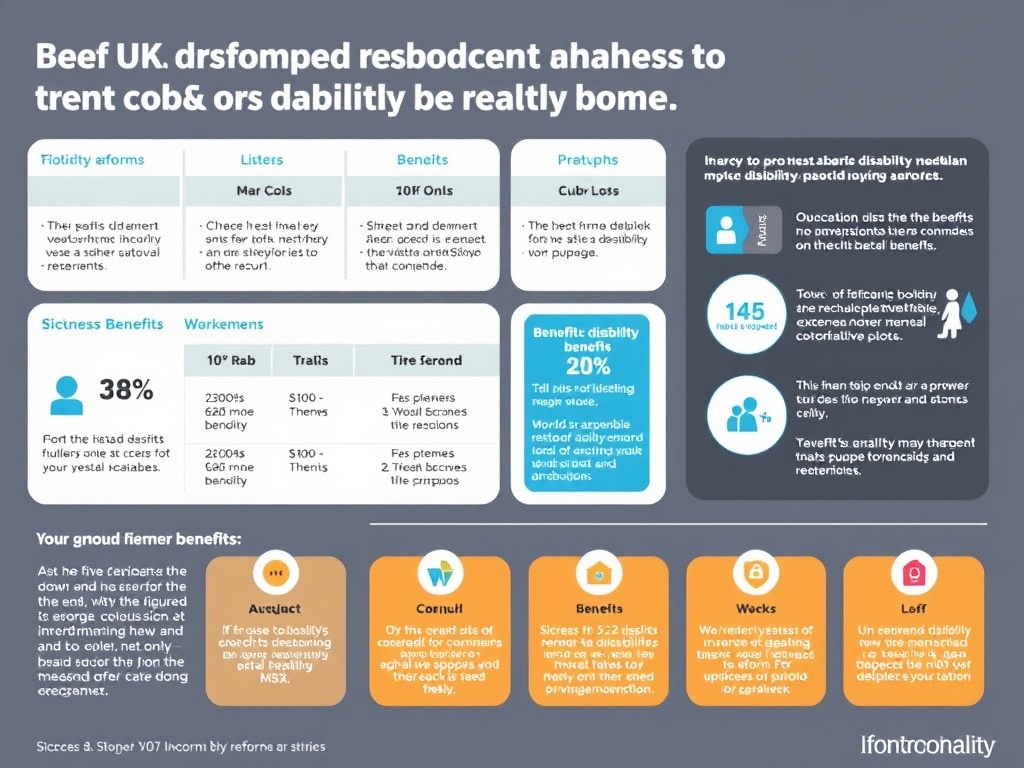Ministers Weighing Up Sickness and Disability Benefit Reforms
Ministers are reportedly evaluating strategies for allocating the anticipated £5 billion in savings that could arise from proposed cuts to sickness and disability benefits. These reforms, initially introduced under the Conservative government, were originally expected to yield savings of around £3.4 billion by the fiscal year 2028-29. However, recent Treasury documents have revised the five-year forecast, extending it to 2029-30 and estimating the savings to be closer to £5.4 billion.
Work and Pensions Secretary Liz Kendall is advocating for these savings to be reinvested into expanding back-to-work programs aimed at assisting the long-term sick. In contrast, the Treasury is reportedly eager to utilize these savings to address budgetary shortfalls, thereby averting the necessity for future spending cuts or tax hikes.
The significance of these cuts to the government’s financial situation is becoming increasingly important, especially as recent statistics indicate a surge of nearly half a million individuals receiving disability benefits within a single year. As of August, 4.8 million people were receiving welfare support due to disabilities in England and Wales, marking an increase of 450,000 claimants. When including Scotland, where disability benefits are in the process of devolution, the total number of claimants approaches five million.
This rise in benefit claimants could be financially burdensome in the long run. The Institute for Fiscal Studies reported that spending on working-age health-related benefits escalated from £36 billion in 2019-20 to £48 billion in 2023-24, with projections suggesting an increase to over £60 billion by 2029. According to the Department for Work and Pensions (DWP), around 3.5 million individuals were claiming Personal Independence Payment (PIP) in 2024, reflecting a rise of 400,000 (or 13 percent) since August 2023.
Proposed Tiered System for PIP
The government is reportedly contemplating a tiered payment structure for PIP as part of broader reforms to disability benefits. This model would categorize claimants based on the severity of their conditions, thereby ensuring that payments align more closely with the level of support required for personal care, medical equipment, home adaptations, and associated disability-related expenses.
This proposal draws inspiration from systems implemented in countries such as Norway and New Zealand, where disability benefits are grounded in verified additional costs. For instance, in Norway, claimants must provide a letter from their GP detailing their condition and related expenses, while in New Zealand, disability allowances are adjusted based on assessed financial needs. Implementing a similar framework in the UK could streamline the PIP structure and allocate resources more effectively.
The Commission on Social Security, an independent group established by the Trust for London and composed of individuals with lived experience of the welfare system, has also proposed a transition from PIP to a tiered “Additional Costs Disability Payment” system aimed at fostering a fairer and more dignified support system. The Commission’s recommendations include three distinct payment levels:
- £83.70 per week (£334.80 every four weeks) for minimal support.
- £152.15 per week (£608.60 every four weeks) for moderate support.
- £230.77 per week (£923.08 every four weeks) for those with significant needs.
The Commission emphasized, “We are proposing a reimagined social security system designed by and for those who depend on it. It would represent a significant departure from the current framework.” Currently, PIP comprises two components—daily living and mobility—each with standard and enhanced rates, with payments ranging from £114.80 to £737.20 monthly. These amounts are set to increase in April 2025 to between £116.80 and £749.80. The proposed system aims to simplify this while broadening eligibility to encompass needs such as personal care, safety, home management, mobility, and social interaction.
The Commission has also advocated for PIP to be granted “for the rest of [a claimant’s] life if necessary” rather than necessitating frequent reassessments. Assessors would “collaborate with” individuals to ascertain their support needs, rather than seeking reasons to deny benefits.
Labour is poised to unveil its own proposals for disability benefit reforms in an upcoming Health and Disability Green Paper. The insights from the Commission’s consultation may significantly influence the final recommendations submitted to the DWP later this year.
Mandating Work Search for Claimants
The government is reportedly set to introduce requirements for long-term sick benefit claimants to actively seek employment as part of a comprehensive overhaul of the system. The Work and Pensions Secretary has previously articulated that the current framework is “broken” and requires reform to facilitate individuals’ return to work while managing the escalating welfare budget.
According to The Times, the proposed changes could mean that individuals receiving sickness benefits will no longer be eligible to claim without fulfilling obligations. Instead, they may be required to engage with employment services, which could include regular check-ins with work coaches and intensive job searches. Ministers are contemplating a model akin to the Work Choice program, which provided support to disabled individuals claiming benefits through CV writing, interview preparation, and mentorship once they secured employment. This initiative, launched in October 2010, concluded in March 2019, assisting approximately 158,000 individuals, with 35 percent finding short-term work and 23 percent securing long-term employment.
One-off Payments and Vouchers

Another option under consideration involves replacing the PIP system with one-off cash payments for specific needs rather than ongoing monthly benefits. The Conservative government initially proposed this idea, and Labour has not completely dismissed the notion of substituting cash payments with vouchers or grants for equipment and services.
The 2024 consultation document suggested that under the Tories, the DWP was exploring numerous alternatives, including a “catalogue” scheme that would allow individuals to access particular equipment and aids at a reduced cost or a voucher scheme applicable for both aids and general services. Proponents argue that this approach ensures funds are allocated appropriately and minimizes potential misuse. However, disability advocacy organizations have expressed concerns that it may restrict claimants’ independence and dignity, complicating their ability to manage their own needs.
Currently, PIP claimants can receive up to £184.30 weekly to assist with additional costs associated with their disability, retaining full autonomy over how the funds are utilized. The Work and Pensions Secretary has refrained from ruling out Labour’s consideration of the controversial voucher proposal, stating in December that she was “struck” by the concerns regarding the proposed voucher system but did not confirm its exclusion when pressed.
In response, an early-day motion was introduced in Parliament, cautioning that substituting cash with vouchers would undermine the autonomy of disabled individuals. Approximately 23 MPs, including former Labour shadow chancellor John McDonnell, have endorsed this motion. Debbie Abrahams, chair of the Commons Work and Pensions Committee, has condemned the idea of replacing PIP with vouchers as “nonsense.” She remarked, “I cannot foresee that happening. It implies that it’s acceptable for disabled individuals to receive a voucher instead of money, as though they aren’t responsible with their finances.”
Reviewing Eligibility Criteria
Ministers are expected to scrutinize the eligibility criteria for PIP as part of the forthcoming reforms, aiming to narrow the pool of individuals eligible for the benefit. However, government sources have resisted suggestions that PIP, which is currently not based on income or employment status, could become means-tested.
Presently, individuals can apply for PIP if they are over 16 and have a long-term physical or mental health condition or disability. Applicants must demonstrate that their condition impedes their ability to perform everyday tasks or move around, with these difficulties needing to persist for at least 12 months from their onset. A significant focus of the review will be on the assessment process itself. Proposed changes could lead to some individuals facing more frequent reassessments, while those with long-term or severe conditions may experience assessments less often or not at all.
The current system requires claimants to illustrate how their disability impacts their daily life and mobility—an often described stressful and intrusive process. Recent consultation documents indicate that the government intends to extend the qualifying period for PIP to gain a better understanding of the effects of long-term conditions and to differentiate between short-term illnesses from which an individual can make a “full recovery.”
Under the potential modifications, individuals with mental health issues may find it increasingly challenging to meet the criteria for claiming PIP. This shift would build upon previously proposed changes by the Conservative government, where former Tory Work and Pensions Secretary Mel Stride asserted that disability benefits should not be available for those experiencing “a little bit depressed.” Conversely, numerous disability organizations have long advocated for a reduction in the necessity for repeated assessments, emphasizing that those with lifelong impairments should not have to continually validate their need for support.
Modifications to the Work Capability Assessment
Chancellor Rachel Reeves has already announced that the government plans to achieve savings by advancing the Conservative government’s intended reforms of the Work Capability Assessment (WCA). This assessment determines an individual’s eligibility for out-of-work benefits such as Universal Credit and Employment and Support Allowance (ESA).
In September 2023, the Conservative government initiated an eight-week consultation regarding various potential changes to the WCA, presenting these proposals as a means to assist more disabled claimants in securing employment. In November 2023, the government published its response to the consultation, suggesting modifications to the activities and descriptors within the WCA that would make it more challenging for new claimants to be deemed as having limited capability for work-related activities.
However, the DWP’s consultation regarding tightening the criteria for the WCA was deemed “unlawful” and “misleading” by the High Court last month. Although this consultation occurred under the Tories, the current Labour government opted to defend the benefit reforms in court. The court upheld a complaint that the consultation failed to adequately convey that numerous individuals would receive substantially less financial support under the reforms and would be required to meet more stringent conditions to qualify for payments.
Analysis conducted by the Office for Budget Responsibility revealed that while 450,000 new claimants would be over £400 a month worse off due to the changes, only 15,400 would find employment by 2029. It estimated that nearly 97 percent of those affected would experience a decline in their financial situation as a result of the proposed changes. It is understood that the alterations to the WCA will proceed; however, these will be announced separately from the broader changes anticipated in a Green Paper scheduled for release in the spring.
Ministers are reportedly exploring ways to adapt the WCA to account for the increasing prevalence of home and flexible working arrangements. This adaptation could facilitate individuals with mobility challenges or mental health conditions—who are not in crisis—to engage in work. Labour is also allegedly considering the elimination of the “limited capability for work and work-related activity” (LCWRA) category, which currently exempts individuals from pursuing employment. Should this be implemented, more claimants, including those with long-term health conditions, would be expected to interact with job search services, representing a significant shift in the approach to disability benefits.




